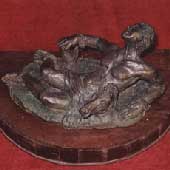 |
It was a Baishe Sravan with a difference at the Rabindra Sadan (August 8). In the centenary year of the swadeshi movement, it’s time for a fresh evaluation of the Tagore songs composed at its wake. Was Tagore emulating the success of our first experiment with civil disobedience movement under the leadership of Chaitanya? Or why did he set most of them in folk tunes that run a close parallel to the kirtan? How long should we consider Tagore’s vision of a ‘Sonar Bangla’ a utopia?
Such thoughts popped up at the stimulating soiree hosted by the West Bengal government’s department of information and culture on the occasion of Tagore’s 64th death anniversary. Conceived by musicologist Sudhir Chakravarti, the presentation not only saw the coming together of the seasoned exponents, but also brought out the courage that characterised Tagore’s patriotic songs.
The prophetic intensity of Amaar sonar bangla found an eloquent articulation in Purba Dam’s (in picture) rendition. In spite of the disappointing choral numbers, the nationalist fervour was carried forward by the convicti-on of Swapan Gupta (Je tom-ay chharhe charhuk), the clai-rvoyance conveyed by Pramita Mallick (Je tore pagal bole), and the perfect renditions by Ashis Bhattacharya and Purabi Mukhopadhyay.










